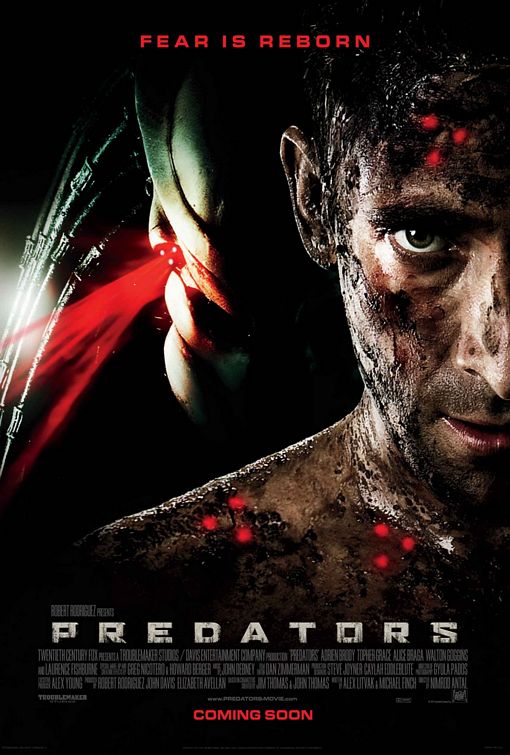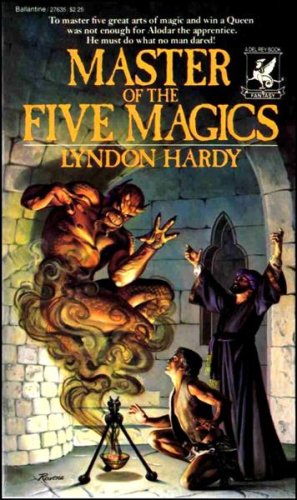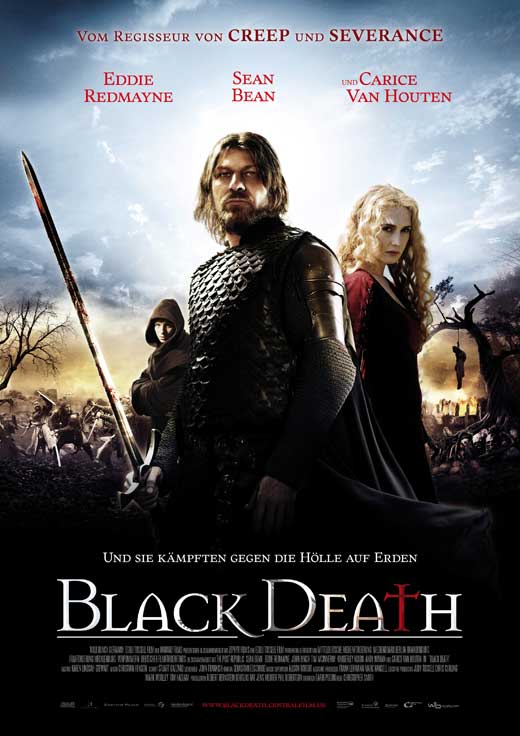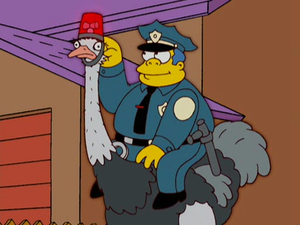Predators
 After a lengthy hiatus, I once again found myself awake and offered the opportunity to watch a presumably terrible SF movie late one night. I’ve been able to avoid temptation for a while, but there it was: Predators, the latest in what has suddenly become the long-running franchise (this is the fifth goddamn movie, a fact that makes you sit and contemplate the universe, which is indeed mysterious).
After a lengthy hiatus, I once again found myself awake and offered the opportunity to watch a presumably terrible SF movie late one night. I’ve been able to avoid temptation for a while, but there it was: Predators, the latest in what has suddenly become the long-running franchise (this is the fifth goddamn movie, a fact that makes you sit and contemplate the universe, which is indeed mysterious).
The fact that they are still making Predator movies is amazing, considering the path this franchise has taken: Start with a surprisingly well-done but decidedly low-rent Schwarzenegger movie made back in Arnold’s heyday, before he was so huge a star he could make terrible role decisions but after he’d learned how to move more than one facial muscle. Then make a batshit insane sequel starring Danny Glover. Then pause for a few years while you marvel at the batshit insane you have created, weaponized, and spread over the world. Then combine your franchise with another equally batshitted franchise and make two curiously dull movies about horrifying and deadly aliens fighting each other.
Then, hire an Oscar winner, Morpheus, and fucking Topher Grace and make one. more. damn. movie.
I’m going to assume we’re all basically familiar with the Predator backstory: Predators are somehow simultaneously technologically advanced and behaviorally primitive. They will shoot you with an energy-based weapon that turns you inside-out, then howl like a fucking ape as they stomp around. They flit about the universe seeking things to hunt and kill, and they’re extraordinarily good at that. They keep coming back to hunt humans, either because we’re a challenge, or because we’re tasty.
Anyways, Predators. Here’s the basic plot outline: The most badassed of badass humans are plucked involuntarily from Earth and dead-dropped onto a mysterious planet that is one huge game preserve for the predators. There’s a Mexican drug cartel enforcer, a Russian soldier, an Israel Defense Forces sniper, an RUF officer, a death row inmate, a Yakuza enforcer, and … a meek doctor.
The meek doctor is played by Topher Grace. This clearly telegraphed that the doctor was More Than He Seems. If the doctor had been even slightly physically intimidating, it might have been a mystery, but when you have one unarmed, untrained man played by Topher Grace in your group of badasses, I immediately think the good doctor must be some sort of mass murderer.
Anyways, these folks have all been chosen because, they assume, they will be a challenge for their new friends the Predators. They are not. This because in movies like this, you have to first establish that the villains are, in fact, the ultimate badasses, otherwise you just assume the protagonists are gonna kill everything within fifteen minutes and you change the channel. So, you know the Predators are going to kill almost everyone. Okay, fine, the movie’s called Predators, not Badass Humans. Still, the opportunity to make something clever is passed over.
The way everyone just drops from the sky, waking up in mid free fall with just seconds to realize they have a parachute strapped to them is kind of cool. When the characters started to assemble I thought for a second that they would form a perfect military unit: A sniper, a heavy gunner, a captain, a doctor. That sort of thing. In a sense I suppose they did do that, but then you have the Cartel enforcer who’s just a dumb guy with some assault rifles, and the Yakuza fellow, who shows up in a nice suit, expensive shoes, and a handgun, and the prisoner, who only has a shiv. I kind of like the idea of an actual unit formed from desperate strangers who all have military training, and watching them either form a chain of command or get killed standing around. This didn’t happen.
Adrien Brody is good. I think Brody has some acting chops, but his choice in films indicates a man who’s stoned out of his gourd more often than not. I imagine Brody waking up in a blood-splattered Vegas hotel room with a contract clutched in one hand and a hooker’s severed hand in the other, and he starts to cry because he knows he’s blacked out and signed on to do another terrible movie. Or beer commercial. So he sells his character, a gruff mercenary who ruthlessly uses the others as resources for his own survival.
The other actors are fine. Laurence Fishburne shows up for a demented couple of minutes as a traitorous man who’s gone insane surviving a few years on the preserve, and he’s fun. The problem is the death-march plot. You are given a handful of characters, you expect them to die in horrific ways, and they do. The basic premise is not a bad one to make a story out of, but they just don’t do anything here. The same events could have happened if the victims had elected to make a camp and cook up some RTE rations, then been slaughtered in their sleep. And the movie would have been 5 minutes long. Win-win!
Still, Brody’s fun, the plot is fast-paced, and it’s basically well made. If you drunk and pantsless in your living room one night while a blank word processor screen mocks you, pour yourself a dram of something inebriating and punch Predators up. Why not?






